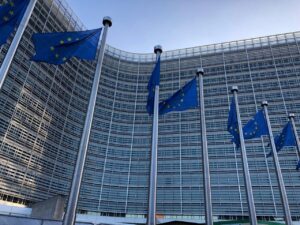I have already written that the threat of US sanctions hangs over the Nord Stream 2 project like a shotgun on the wall. The new list of Russian officials covered by the restrictions is like taking a trigger. We do not know whether the US will pull the trigger, because they still count on the opinion of divided Europeans and do not want to be one who break the business ties with Russia – writes Wojciech Jakóbik, editor-in-chief of BiznesAlert.pl.
Poker faces of Gazprom and friends
The president of Gazprom among others appeared on the list of new US personnel sanctions for the illegal annexation of Crimea and Russian aggression in Ukraine. Alexei Miller himself assures that this is the best confirmation of the company’s proper policy. Including him in the restrictions does not mean that sanctions will have a direct impact on its flagship project Nord Stream 2, criticized in Poland and an increasing number of EU countries. It is a gas pipeline from Russia to Germany, which is to be built by the end of 2019. It is not known whether this will happen, because the actions of his opponents may delay him at least.
Personnel sanctions against the Gazprom president may strike indirectly in Nord Stream 2. When restrictions were imposed on Rosneft’s and the company’s president Igor Sechin himself, after the period of withdrawal from the Russian Arctic seas license Exxon Mobil withdrew. He was punished by the State Department’s punishment of two million dollars for cooperation with the sanctioned entity. The western companies that financially support Gazprom may be in a similar fate, for example on the Nord Stream 2 project, namely Shell, OMV, ENGIE, Uniper and Wintershall. Wintershall has already announced that although it is not withdrawing its support for the project, it will look closely at the development of the situation.
An interesting case was the impact of US sanctions on the will of cooperation between the Dutch-British Shell. The Americans imposed them on the mining project of Yuzne Kirinskoye in 2015. It was the apple of Gazprom’s and Shell’s eye, because it was to be the raw material base for the development of the only LNG terminal in eastern Russia, the Sachalin LNG project. The companies signed a cooperation agreement in the liquefied gas sector, which gave the Russians the prospect of increasing their share in this sector, and the possibility for Shell to take over the trader with liquefied gas BG Group to expand its operations around the world, headed by Asia, where the price remains the most attractive. Due to US sanctions, the project has been frozen. Although Shell remained in it, it did not undertake any work.
The threat may or may not be enough
Is Nord Stream 2 to face for such a fate? If the threat of a shot from an American rifle already hanging on the wall is real enough to induce the hesitation of the European partners of Gazprom, this could lead to a delay in the project. The possibility of blocking the Danish section and hence the need to revise the gas pipeline route, as well as work on the revision of the gas directive initiated by the European Commission come along. It is worth noting once again that EU regulations have already blocked one Gazprom project – South Stream. However, even delay means an advantage and more time to change the status quo in the gas market in Central and Eastern Europe in favor of diversification.
Even if the US president decides to sanction the Nord Stream 2 partners, as the Congress gave him such right in the past, it is not said that the project will be blocked. However, its delay is increasingly real and the entities involved in Nord Stream 2 do not want to officially allow it. The threat of the State Department’s punishment for collaborating with Alexei Miller may or may not be disciplined.
The fluctuation of the European side is demoralizing, which is one of the likely reasons for the lack of direct sanctions against Nord Stream 2. The Americans do not want to be the only ones to withdraw from cooperation with Russian entities. On April 7, the European Commission approved the possibility of a joint venture between General Electric and Rosneft called Sibintek, due to the lack or negligible impact on the European market. If Europe does not want to give up business with Russia, the Americans will have less incentives to burn the last bridges stretched by their business.








